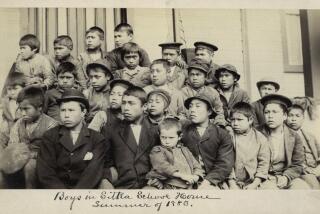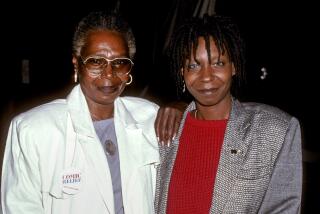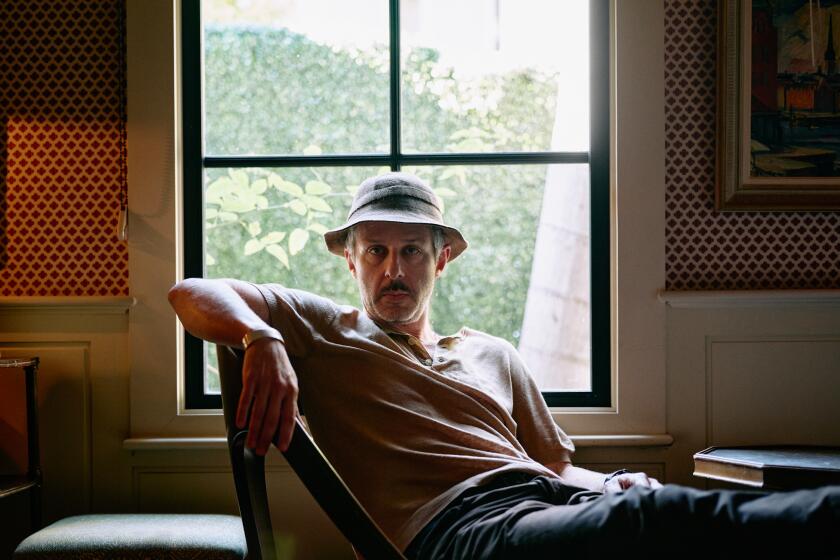‘Rosenwald’ documentary looks at Jewish philanthropist who helped black schools
Inspired by the Jewish ideals of tzedakah (charity) and tikkun olam (repairing the world), Julius Rosenwald partnered with African American communities to fund some 5,300 schools for African American children in the Jim Crow-era South.
The Rosenwald Fund also gave fellowships during the Depression to such noted African American artists as Marian Anderson, Ralph Bunche, Ralph Ellison, Gordon Parks and James Baldwin to bolster their careers.
The documentary “Rosenwald,” which opens Friday, chronicles how the longtime president of Sears — who never graduated from high school — became one of the leading philanthropists of his time.
Aviva Kempner, the writer, director and producer of “Rosenwald,” had never heard of his accomplishments until 12 years ago when she was vacationing in Martha’s Vineyard. Kempner went to a talk titled “Blacks and Jews” led by Rabbi David Saperstein and the late civil rights leader Julian Bond, whose educator father Horace had been helped by Rosenwald fellowship money.
SIGN UP for the free Indie Focus movies newsletter >>
“Julian went on and on about Julius Rosenwald,” said Kempner in a recent interview. “This lightbulb went off, and I said, ‘This is what I have to go do.’ ”
Kempner has made it her mission to tell stories about the accomplishments of Jewish people. She produced and directed the award-winning 1998 documentary “The Life and Times of Hank Greenberg,” because the famed Detroit Tigers baseball player was “really a hero to American Jews at the time where there was great domestic anti-Semitism,” she said.
Her last documentary, 2009’s “Yoo-Hoo, Mrs. Goldberg,” explored the career of radio and TV pioneer Gertrude Berg. “Gertrude Berg has more to do I think with the unfair depiction of Jewish women on screen,” she said. “I thought Gertrude Berg’s show had a very warm and loving Jewish mother.”
“Rosenwald,” she noted, presents a “very positive” image of a philanthropist and wealthy man.
And a humble one who kept his accomplishments out of the limelight as much as possible.
“He wanted to do it for the good of educating and housing people,” Kempner said.
Audiences attending screenings, she said, have been inspired. “What makes me feel good is that young people walking out of the theaters both black and white are saying this is the kind of thing I can do. My line is that we don’t have all the financial ability of Julius Rosenwald. But we can have a little bit of Julius Rosenwald in us.”
Born in 1862, the son of German Jewish immigrants was inspired by Rabbi Emil Hirsch of Chicago Sinai Congregation. Rosenwald helped some 100,000 poor Jewish immigrants living in Chicago and then turned his attention to poor African Americans after reading some pivotal books such as Booker T. Washington’s “Up From Slavery.”
In 1910, he met with Washington, who was head of the Tuskegee Institute in Alabama, and soon joined the black college’s board of directors.
“When it was his 50th birthday, he was giving away his money [to charities], and he said to Washington, ‘What do you want to do with yours?’ ”
Washington told Rosenwald he wanted to build decent schools for African American children. With his challenge grants, Rosenwald partnered with African American communities to build the schools.
“They started with five, and it grew and grew,” said Kempner. “Blacks wanted to be educated. They knew if they were kept away from education, they would just spend the rest of their lives in the field.”
Among those who attended Rosenwald schools were author and poet Maya Angelou, director George C. Wolfe and Washington Post Pulitzer Prize-winning writer Eugene Robinson.
(Rosenwald died in 1932; the last Rosenwald school was constructed in 1933. And in 1948, the Rosenwald Fund ended.)
Angelou, Wolfe, Robinson, Bond, Saperstein, Eleanor Roosevelt Seagraves (the granddaughter of Rosenwald Fund board member Eleanor Roosevelt) and Peter Ascoli (Rosenwald’s grandson and biographer) are among those who appear in the documentary.
Robinson had no idea that the Felton Training School he attended in Orangeburg, S.C., had been a Rosenwald school. The building, which is no longer in existence, was on the campus of the historic black college South Carolina State University.
“I never heard the name Rosenwald in connection with the school,” Robinson said in an interview about the film. “When I heard of Rosenwald and saw one of the pictures of the buildings, I thought it was just like the school I went to.”
Felton, he said, consisted of four big rooms with two grades in each room and four permanent full-time teachers. “Students went on to do well from our school,” said Robinson. “It was a good place to go to school. It couldn’t have been more nurturing.”
The schools ceased to exist with desegregation. The National Trust for Historic Preservation, Kempner noted, is in the midst of restoring the existing buildings.
Kempner believes the message of “Rosenwald” remains timely.
“I think we have to think of new ways of improving people’s lives,” she said. “Just like black lives matter, I think history matters.”
Twitter: @mymackie
More to Read
Only good movies
Get the Indie Focus newsletter, Mark Olsen's weekly guide to the world of cinema.
You may occasionally receive promotional content from the Los Angeles Times.










